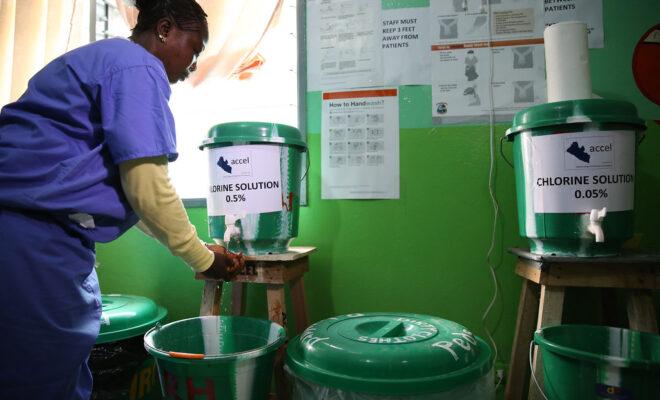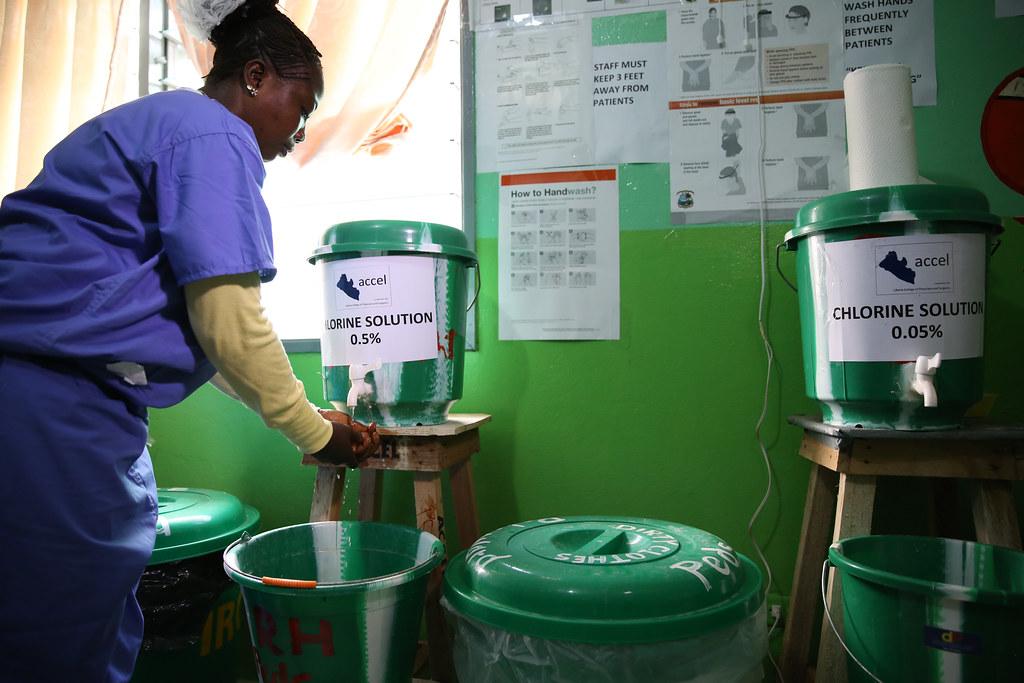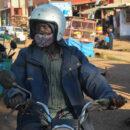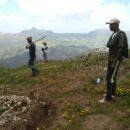Coronavirus’ triple hit in Africa on health, the economy and politics

The effects of the global pandemic will go far beyond just health concerns.

Garmai Garbo, a nurse in Monrovia, Liberia, washes her hands during the 2014-15 Ebola outbreak. Credit: Dominic Chavez/World Bank.
Read all our COVID-19 coverage
The coronavirus Covid-19 has delivered a massive shock to the world. We will all be adjusting to it not just for months but years. The pandemic will continue to have major implications for the whole world and it is not too soon to start thinking about them, even while the immediate priority must be to tackle the infection and reduce the death toll.
As infections go, the coronavirus is by no means the most deadly. But it is clearly extremely infectious and capable of spreading extraordinarily fast. In the space of just days and weeks, countries across the world have gone from business as usual to near lockdown once affected.
Africa, which until last week had appeared relatively impervious to infection, is beginning to see a more extensive spread of the virus. South Africa has started to identify internal infections; in Kenya, an infected visitor has passed on the disease to nationals; and, as African Arguments’ Coronavirus in Africa Tracker shows, Egypt is starting to record confirmed cases in the low hundreds.
Despite these worrying cases, there is reason to hope Africa will be able to avoid the extreme level of disruption that affected East Asia last month and Europe over the past week or two. Firstly, there is the experience of Ebola which, as Paul Richards has written in African Arguments, has taught important lessons about engaging communities in dealing with infectious diseases.
Secondly, many African governments – including Ethiopia, Ghana, Cote d’Ivoire, Sudan, Zambia and Rwanda – are well ahead of the curve in introducing new restrictive measures. This includes the closure of schools and stopping football matches as well as a ban on inward visitors from infected countries. Some may feel these steps are disproportionate, but the evidence from Europe and the US suggests it is wiser to be cautious and act sooner rather than later. As Arkebe Oqubay has written for ODI, there are lessons to learn, both good and bad, from Europe’s efforts to tackle the virus.
The economic hit
But Africa cannot dodge the hit to the world economy. In the medium term, it already looks as though the economic damage of the infection may outweigh its medical impact. It is not just the plummeting stock markets, prices and interest rates, but the direct hit on major industries, including travel, transport and services of almost all kinds that has precipitated a global economic crisis. Western governments will step in to prop up domestic businesses by spreading cash around, but few African governments have those kinds of resources available.
This economic hit comes on top of man-made economic crises including the US-China trade war, Brexit, and the oil price war precipitated by Saudi Arabia and Russia. This combination of factors is already impacting African economies and there appears little governments can do to protect themselves. Countries still dependent on commodity exports – oil producers above all, but others too – and those already deep in debt with little room to borrow more are the most vulnerable to the chill winds of global recession.
Here too, though, African countries have a degree of resilience. Those dependent on subsistence farming and living in rural communities are relatively well-placed to ride out a global financial slump as well as the infection. The growing number of urban-dwellers – now nearly half of Africa’s population – will find it more difficult, though a return to living with relatives in rural areas can help by thinning people out and spreading the burden of feeding, if it happens before infection has spread too far. Mobile communications technology in these circumstances can help by disseminating practical advice and factual information, if used wisely.
But the efforts to reduce poverty in Africa, both by governments and the private sector, will take a hit.
Eventually the infection will pass and the world economy will rebound. But much of the damage will be lasting. Companies will have disappeared; savings will have been consumed; and markets will have been lost. Every crisis presents opportunities, but seizing those opportunities requires some access to capital. In much of Africa, this may be something only external sources can provide. This means it will be essential that the IMF, World Bank, donors and other international lenders continue to play their part and provide adequate financial support for Africa in its time of need, especially if there is a slump in remittances.
Political impacts
There will be political ramifications as well.
One thing that is already clear is that the weakest response to the coronavirus pandemic has been from nationalist populist governments. Covid-19 is not a challenge susceptible to being deflected by fake news, xenophobia or bombast. It requires scientific evidence, rational judgement, a national consensus and international cooperation, all things that the deliberate divisiveness and insularity of populist leaders are incapable of delivering.
Dealing with coronavirus, in all countries, depends heavily on social cohesion. To accept, and adapt to, the drastic social measures necessary to limit contagion requires a degree of social sympathy and understanding, a willingness to help each other, and an acceptance of and trust in the authority of government to impose controls. Unfortunately, this is often lacking.
In a place like the US, which effectively finds itself leaderless in this crisis, it will likely be the people that will have to save the country. In countries across Africa too, it may be the people more than governments that demonstrate the national maturity needed to tackle the disease. In this crisis, governments would be wise to listen to their people as well as direct them. Let us hope this lesson is learnt swiftly.







I have an article on the African economies and covid19. How can it published on your website?